新概念英语第一册117课
新概念第一册117课

• While we were having breakfast, our little boy, Tommy, found two small coins on the floor. • • He put them both into his mouth. We both tried to get the coins, but it was too late. Tommy had already swallowed them!
② v. 吞并;侵吞
Our company was swallowed up by an American company last year. 我们公司去年被一家美国公司吞并了。
Key words&expressions
★ mouth
• • • • • •
n. 嘴 Open your mouth. 张开你的嘴。 eyebrows, eyes, nose,闭嘴(口) ears, mouth Shut your mouth. 眉毛,眼睛,鼻子,耳朵,嘴巴 from hand to mouth 勉强糊口 from mouth to mouth口口相传的 have a big mouth大嘴巴,嘴不严
Key words&expressions
★ coin n. 硬币 (note 纸币) toss a coin 掷硬币(打赌正面或反面) • Pay a person back in his own coin. 以其人之道还治其人之身。
later 1) adv. 后来,较迟地,较后地 e.g. three days later 三天后 e.g. He came later than usual. 他比平常来得晚。 2)adj. 较迟的,较后的,更近的。 e.g. Let‟s take a later train. 我们搭晚一点的火车吧。 drop v. (意外)掉落;使掉落 e.g. A drop in the bucket/ocean.
新概念第一册 117课笔记
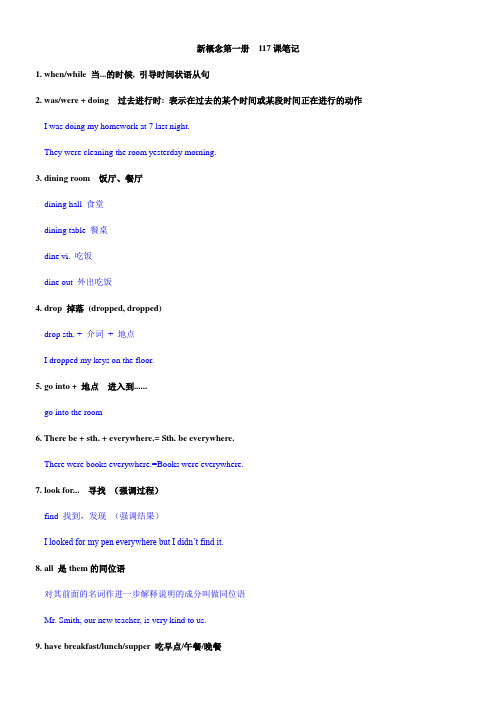
新概念第一册117课笔记1. when/while 当...的时候, 引导时间状语从句2. was/were + doing 过去进行时: 表示在过去的某个时间或某段时间正在进行的动作I was doing my homework at 7 last night.They were cleaning the room yesterday morning.3. dining room 饭厅、餐厅dining hall 食堂dining table 餐桌dine vi. 吃饭dine out 外出吃饭4. drop 掉落(dropped, dropped)drop sth. + 介词+ 地点I dropped my keys on the floor.5. go into + 地点进入到......go into the room6. There be + sth. + everywhere.= Sth. be everywhere.There were books everywhere.=Books were everywhere.7. look for... 寻找(强调过程)find 找到,发现(强调结果)I looked for my pen everywhere but I didn’t find it.8. all 是them的同位语对其前面的名词作进一步解释说明的成分叫做同位语Mr. Smith, our new teacher, is very kind to us.9. have breakfast/lunch/supper 吃早点/午餐/晚餐注意:三餐前不能有冠词the10. put sth. into... 把......放进......put the books into the bag11. both 两个都(1) 放在主语后边,作同位语,表示“两者都......”We both like English.(2) both of + 人称代词(宾格)Both of them 他们两个人=They both...注意:both用于两者,all 用于三者或以上,结构同both,他们的位置通常放be动词后实义动词前12. try to do sth. 试图做某事;努力做某事try doing sth. 尝试做某事13. 过去完成时:had + done过去完成时表示过去某一时间或动作以前已经发生或完成了的动作。
免费 New Concept English新概念英语第一册117-118课课件
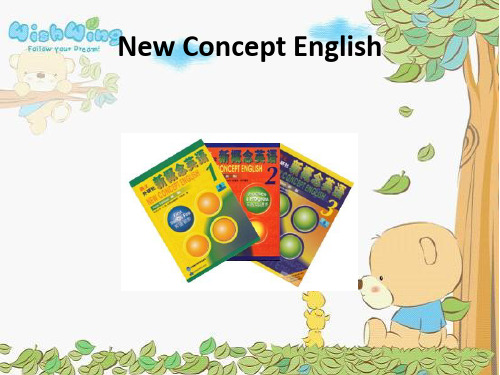
• Later that morning, When I was doing the housework, my husband phoned me from the office. • later that morning 那天上午晚些时候 • when I was doing the housework… • 是过去进行时态,表示过去正在进行的动作。 • my husband phoned me from the office • 是一般过去时,表示比较短晢的动作或事情。
New Concept English
Lesson 117 Tommy's breakfast
单词学习
• • • • • • dinning room(hall) coin mouth swallow later toilet 饭厅 n. 硬币 n. 嘴 v. 吞下 adv. 后来 n. 厕所,盥洗室
• • • • • • • • • • •
swallow ① v. 吞下,咽下 Tommy swallowed the coins. ② v. 抑制,使不流露 I tried hard to swallow my doubts. 我强忍着不露出怀疑的神色。 她忍住没笑,静静地坐在那里。 She swallowed a smile and sat there still. ③ v. 吞并;侵吞 我们公司去年被一家美国公司吞并了。 Our company was swallowed up by an American company last year. • Nazi Germany nearly swallowed up the whole Europe in World War II. • 第二次世界大战中,纳粹德国几乎吞并了整个欧洲。
Lesson117(课件)新概念英语第一册
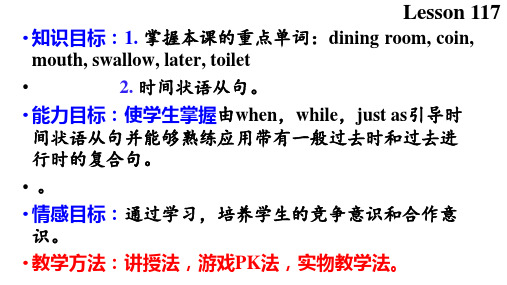
翻译下列句子。 • 1. 当我到达时,她正在做饭。 • When I __a_r_ri_v_e_d_, she_w_a_s___ _c_o_o_k_in_g_ a meal. • 4. 当我读书时,我妈妈正在做饭。 • _W__h_i_le____I was reading , • my mother __w_a_s_____ __c_o_o_k_i_n_g_____.
• A. him B. his
C. himself D. it
• (A) 4. Have you ever _______ Shenzhen?
• A. been to B. gone to C. went to
D. gone in
• (C ) 1. When he _______ I _______ a bath.
do housework
phone me from the office
一、选择题
• (C) 1. I _______ my pen everywhere but I couldn’t _______ it.
• A. looked for, found
B. found, looked for
• C. looked for, find
•。
• 情感目标:通过学习,培养学生的竞争意识实物教学法。
翻译下列句子。 • 1. 当我到达时,她正在做饭。 • When I ________, she______ _______ a meal. • 2. 当我读书时,我妈妈正在做饭。 • _________I was reading , • my mother _________ _____________.
While ... have breakfast, Tommy, find two small coins
新概念英语第一册第117-118课件
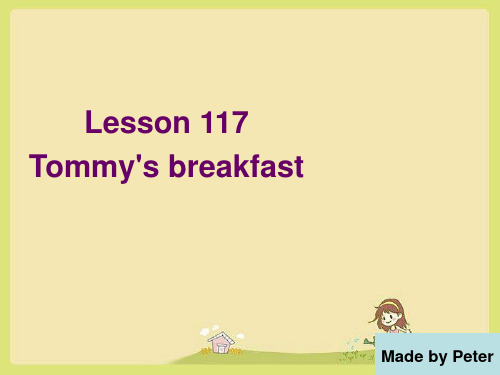
Chinese Breakfast
• • • • • • • • • • • • • 油条 水饺 蒸饺 馒头 饭团 蛋饼 豆浆 稀饭 白饭 蛋炒饭 米粉 馄饨面 酸辣汤 • • • • • • • • • • • • • fried bread stick boiled dumplings steamed dumplings steamed buns rice and vegetable roll egg cakes soybean milk rice porridge plain white rice fried rice with egg rice noodles wonton & noodles hot and sour soup
Joe was reading a book. Carfield was watching TV. while When Joe was reading a book,Carfield was watching TV.
过去进行 时
Grammar
现在进行时: 构成:
主语+is/am/are +动词的现在分词(ing) 过去进行时 (8A U6)
Key words and expressions
• • • • 三天后 回头见,再见 早晚,总有一天 他比平常来得晚 • • • • three days later see you later sooner or later He came later than usual.
★
later
1) adv. 后来,较迟地,较后地 2) adj. 较迟的,较后的,更近的 in one’s later life 我们搭晚一点的火车吧。 Let’s take a later train.
新概念英语第一册117课

❖ ‘How’s Tommy?’ he asked.
❖ ‘I don’t know,’ I answered, ‘Tommy’s been to the toilet three times this morning, but I haven’t had any change yet!’
7. Mike and I___(play) basketball at that time yesterday afternoon.
课文讲解
❖ When my husband was going into the dining room this morning, he dropped some coins on the floor.
o’clock last night.
Practice Time!
1. While she ___ TV, Penny ___ asleep.
A. watches, was falling B. was watching, fell C.was watching, was falling D. watch, fell KEY: B
❖ As the children were playing in the garden, it began to rain.
❖ He put them both into his mouth. We both tried to get the coins. But it was too late. Tommy had already swallowed them!
I was having dinner when he came in.
新概念英语第一册第117课Lesson117课文单词知识点

Lesson117When my husband was going into the dining room this morning, he dropped some coins on the floor.There were coins everywhere. We looked for them, but we could not find them all.While we were having breakfast, our little boy, Tommy, found two small coins on the floor.He put them both into his mouth. We both tried to get the coins, but it was too late. Tommy had already swallowed them!Late that morning, when I was doing the housework, my husband phoned me from the office.'How's Tommy?' he asked. 'I don't know,' I answered, 'Tommy's been to the toilet three times this morning, but I haven't had any change yet!' 今天早晨我丈夫走进饭厅时,把一些硬币掉在地上了。
到处都是硬币。
我们虽然找了,但没有把它们全部找到。
正当我们吃早饭时,我们的小男孩汤米在地上找到两枚小硬币。
他把这两枚硬币全都放进嘴里。
我们俩都试图把这两枚硬币拿出来,但太迟了。
汤米已经把硬币咽了下去!那天下午的晚些时候,当我正做家务时,我丈夫从办公室打来电话。
新概念英语第一册117课课件
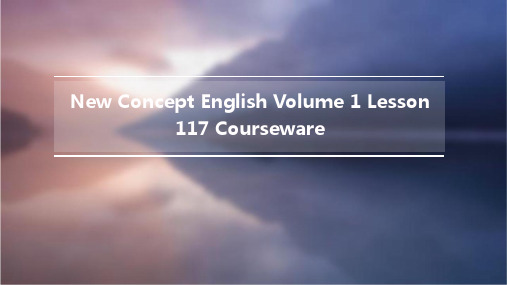
Words and expressions
The text includes a variety of useful vocabulary and expressions related to learning English.
04
reading comprehension
Reading materials
Text
"The Olympic Games"
Background information
The history and development of the Olympic Games, the significance of the Games in modern society, and the role of the Olympics in promoting global peace and friendship.
Some examples of words and expressions are: "global language," "interconnected world," "essential," "communication," "learning curve," "fluency," "conversational skills."
01
Sorting out the content of the text
Topic of the text
The topic of the text is about the importance of learning English.
新概念英语第一册117课课件资料ppt

housework, my husband telephoned me from the
office.
earlier
早些时候
给某人打电话
该句为when 引导的时间状语从句
主句为一般过去时表示比较短晢的动作或事情
‘How’s Tommy ?’he asked . ‘I don’t know ,’I answered . ‘Tommy’s been to the toilet three times this morning , but I haven’t had any change yet .
but连接的并列句
has been to 去过某地 time 次数,(可数): three times > twice > once change 零钱 = coin Change 变化 双关语 yet 用于完成时的否定句和疑问句中。
Phrases
1. go into… 2. go out of… 3. look for
Later that morning ,when I was doing the housework ,Bill phoned me from
the office .
过去进行时表示
后来,晚些时候 later that morning,
从句
when I
w过as去正d 在o i进n行g的动t作he。
Focus on grammar
We looked for them, but we could not find them all.
While we were having breakfast, our little boy, Tommy, found two small coins on the floor.
新概念英语第一册课文翻译及学习笔记Lesson117知识分享

新概念英语第一册课文翻译及学习笔记Lesson117【课文】When my husband was going into the dining room this morning, he dropped some coins on the floor.There were coins everywhere. We looked for them, but we could not find them all.While we were having breakfast, our little boy, Tommy, found two small coins on the floor.He put them both into his mouth. We both tried to get the coins, but it was too late. Tommy had already swallowed them!Late that morning, when I was doing the housework, my husband phoned me from the office.'How's Tommy?' he asked. 'I don't know,' I answered,'Tommy's been to the toilet three times this morning, but I haven't had any change yet!'【课文翻译】今天早晨我丈夫走进饭厅时,把一些硬币掉在地上了。
到处都是硬币。
我们虽然找了,但没有把它们全部找到。
正当我们吃早饭时,我们的小男孩汤米在地上找到两枚小硬币。
他把这两枚硬币全都放进嘴里。
我们俩都试图把这两枚硬币拿出来,但太迟了。
汤米已经把硬币咽了下去!那天下午的晚些时候,当我正做家务时,我丈夫从办公室打来电话。
新概念英语lesson117
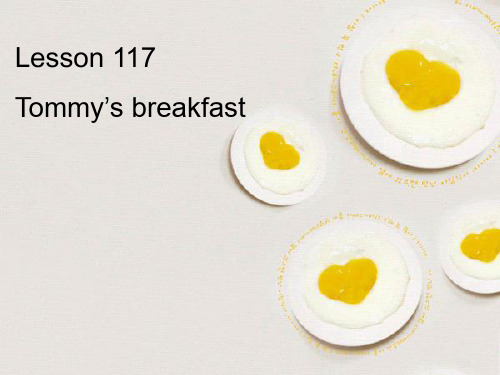
Why is an empty purse always the same? There is no change in it. (零钱,变化 零钱, 零钱 变化)
Translation
1)别把你的秘密告诉她。她说话嘴松。(秘密 secret) )别把你的秘密告诉她。她说话嘴松。(秘密 。( ) 2)昨天,当电话响起时,我正在做饭。 )昨天,当电话响起时,我正在做饭。 3)当我回到家的时候,他没有在读报纸。 )当我回到家的时候,他没有在读报纸。 4)昨天下午三点半,你正在卧室里读书吗? )昨天下午三点半,你正在卧室里读书吗?
‘How's Tommy?’he asked. ‘I don't know,’ I answered, ‘Tommy's been to the toilet three times this morning, but I haven't had any change yet!’
“汤米怎么样?”他问。 “我不知道,”我回答说, 汤米怎么样? 他问。 我不知道, 我回答说, 汤米怎么样 今天上午汤米去了3次厕所了 次厕所了, “今天上午汤米去了 次厕所了,但我还没看到硬 币!”
Lesson 117 Tommy’s breakfast
New words and expressions
dining room coin mouth swallow later toilet
饭厅 n.硬币 硬币 n.嘴 嘴 v.吞下 吞下 adv.后来 后来 n. 厕所,盥洗室 厕所,
dining room dining table sitting room / living room bedroom kitchen balcony garden
新概念英语第一册117课 课件(共17张PPT)
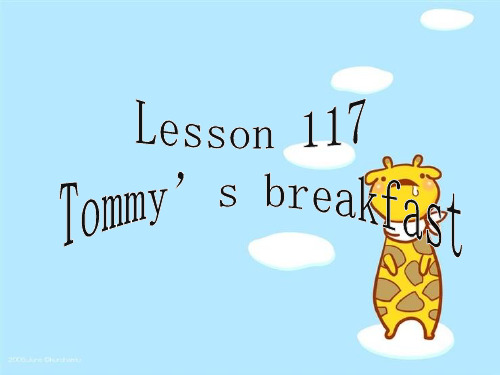
• 5. The train left when I was buying the tickets.
• 6. It rained heavily when I was driving to London.
A. is having B. have C. has D. was having
4. What ____ you ____from 7 to 9 yesterday ? A. were, doing B. did. do C. have, done
5.Look! Lily with her sister __ a kite on the playground.
shaving
cut
Exercise P239
• 1. He knocked at the door when I was answering the phone.
• 2. He came downstairs when I was having breakfast.
• 3. The phone rang when I was washing the dishes.
过去进行时VS现在进行时
结构
现在am/is/are+v-ing 过去was/were+v-ing
The students are drawing pictures now.
The students were drawing pictures when the teacher came in.
3.时间状语:
New words and expressions
dining room
新概念英语第一册117课课件

Language logic
Detailed description
Through sentence translation exercises, students can learn the language logic of English, improve the fluency and accuracy of English expression.
Vocabulary exercises
Summary words
Vocabulary application
Detailed description
Through vocabulary practice, students can learn how to apply newly learned vocabulary in practical contexts, deepening their understanding of the meaning of vocabulary.
indicates an action in the future or plan, often preceded by "to". For example, "I want to go to the park."
02
Analysis of key and difficult points
Key vocabulary and pd expanded knowledge
English listening and speaking training
Listening training
Provide listening materials related to the content of the text, such as English news, movie clips, etc., to help students improve their English listening skills.
新概念英语第一册117-118
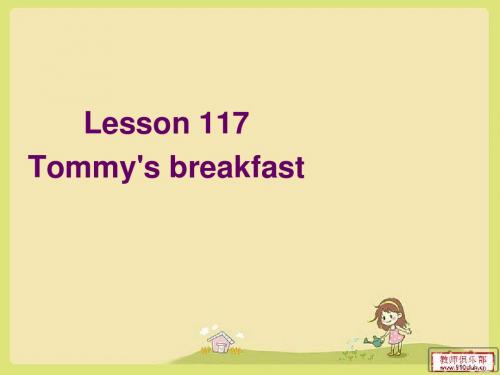
Key words and expressions
★ swallow
1) v. 吞…,咽… • He swallowed (up) the medicine with water. 他把药和水一起吞下。 2) n. 一口 (一口的量) take a swallow of beer 喝一口啤酒 at one swallow 一饮而尽
video
Language points
1.When my husband was going into the dining room this morning, he dropped some coins on the floor. • 过去进行时:强调过去某个时间正在发生的事。 was/were + doing • drop: 掉下 • 丢失,丢掉 I dropped my pen at school.
Language points
2.There were coins everywhere. 复合不定代词
Every One Thing Body Everyone Everything Everybody No No one Nothing Nobody Any Anyone Anything Anybody Some Someone Something somebody
三、 1. 过去进行时的肯定式: 主语+was/were + 动词的现在分词 2. 过去进行时的否定式: 主语+was/were not +动词的现在分词 3. 过去进行时的疑问式: Was/Were + 主语+ 动词的现在分词?
Grammar
过去进行时
肯定句:We were having supper when the phone rang. 我们正在吃晚饭时电话响了。 否定句: We were not having supper when the phone rang. 一般疑问句: Were you having supper when the phone rang? Yes, I was./ No, I wasn't.
新概念英语第一册 lesson 117
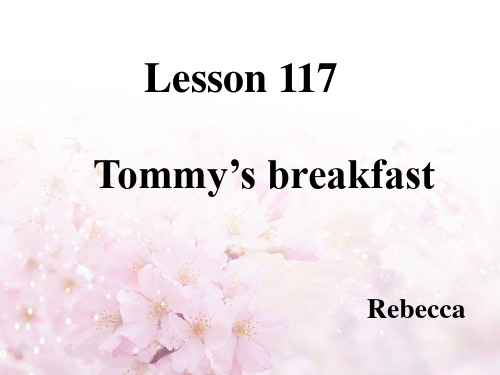
Later that morning, when I was doing the housework, my husband phoned me from the office.
"How is Tommy?" he asked. "I don't know," I answered, "Tommy's been to the toliet three times this morning, I haven't had any change yet!"
The boss arrived when I was typying a letter. The train left when I was buying the tickets.
6. It rained heavily. I drove to London.
It rained heavily when I was driving to London.
Example: He arrived. I had a bath. He arrived when I was having a bath.
4. The boss arrived. She typed a letter. 5. The train left. I bought the tickets.
While we were having breakfast, our little boy, Tommy, found two small coins on the floor.
Tommy's break来自astHe put them both into his mouth. We both tried to get the coins, but it was too late. Tommy had already swallowed them!
新概念英语第一册第117课课件讲课讲稿

117课 过去进行时练习: 一、仿照例句用所给 的词汇造句。
1. I, see him, he, cross the street I saw hi m while he was crossing the street. (He was crossing the street when I saw him.) A. the sun, shine, we, come out B. she, study at college, the war, break out C. she, work in a factory, the city, be liberate d (放) D. he, lose his pen, he, go sightseeing in th e city
阅读课文回答问题
What does the she mean by ‘change’ in the last sentence ?
再看一遍课文
When my husband was going into the dining room this morning
he dropped some coins on the floor.
定语从句的先行词是名词或代词;而同位语从句的先行词只能是 名词,而且仅限于idea,plan,fact,theory,promise,hope, news,doubt,truth,information,suggestion,question, thought,belief,conclusion等少数名词。
本课语法同位语
同位语,代表一个名词(或其它形式)对另一个名词或代词进行 修饰,限定或说明。同位语与被它限定的词的格要一致,并常常紧 挨在一起。
由两个或两个以上同一层次的语言单位组成的结构,其中前项与 后项所指相同,句法功能也相同,后项是前项的同位语其中常用 ‘and’连接。
新概念英语第一册第117课(课堂PPT)

117课 过去进行时练习: 一、仿照例句用所给 的词汇造句。
1. I, see him, he, cross the street I saw hi m while he was crossing the street. (He was crossing the street when I saw him.) A. the sun, shine, we, come out B. she, study at college, the war, break out C. she, work in a factory, the city, be liberate d (放) D. he, lose his pen, he, go sightseeing in th e city
17
1. While we __________ (wait) for the bus, a girl __________ (run
) up to us.
2. I __________ (telephone) a friend when Bob __________ (com
e) in.
3. Jim __________ (jump) on the bus as it __________ (move) aw
1
阅读课文回答问题
What does the she mean by ‘change’ in the last sentence ?
2
再看一遍课文
3
When my husband was going into the dining room this morning
4
he dropped some coins on the floor.
新概念英语第一册Lesson 117

2. Penny __ dinner when she cut her fingers. A. had B. having C. was having D. is having KEY: C
3. While we ___ (wait) for the bus, a girl ___(run) up to us. 4. I ___ (telephone) a friend when Bob ___ (come) in. 5. While mother ___(put) Cathy to bed, the door bell ___ (ring). 6. Jane___(wait) for me when I___(arrive). 7. Mike and I___(play) basketball at that time yesterday afternoon.
• 常用时间状语 When, while, a moment ago, from nine to ten last evening, at that time • when既指时间点,也可指一段时间, while只指 一段时间,因此when引导的时间状语从句中的 动词可以是终止性动词,也可以是延续性动词, 而while从句中的动词必须是延续性动词。 I was having dinner when he came in. He came in when I was having dinner While I was having dinner, he came in. Mom was reading while Dad was watching TV.
7. Little和small little当“小”的意思时指的是“小而可 爱” a little girl. small指的是尺寸,数量型号上的“小”, 没有感情色彩。 a small box 8. both 两者都…… 两个或两个以上用all Both of us are students. We are both……。 All of us are students. We are all……。
新概念英语第一册第117课完整ppt课件

阅读课文回答问题
What does the she mean by ‘change’ in the last sentence ?
精选ppt
再看一遍课文
精选ppt
When my husband was going into the dining room this morning
精选ppt
续的或同时发生的,那么主从句的动词都可用过去
进行时。
精选ppt
本课语法过去进行时
1.过去进行时由“主语+was/were+动词ing”构成 2.过去进行时的否定式由“主语+was/werenot+现 在分词”构成 3.过去进行时的疑问式由“was/were+主语+现在 分词”组成 句型 肯定句=主语+was/were+doing+其它 否定句=主语+was/were+not+doing+其它 一般疑问句问语=Was/Were+主语+doing+其它 答语:Yes,Iwas/were.或No,Iwasn't/were’t. 特殊疑问句=特殊疑问词精+选p一pt 般疑问句+其它
精选ppt
本课语法
1.look for,寻找(强调动作过程);find,找到(强调寻找的结 果)。 2.Tommy had already swallowed them! 汤米已经把硬币咽了下去 句中用了过去完成时形式 had swallowed。过去完成时用来表示过去 两个动作中发生在前的那个动作。显然,句中咽下硬币的动作发生在 夫妇俩能够把硬币从汤米手中抢过来之前。 3.later that morning,那天上午的晚些时候。 later是副词late的比较级。 4.any change change是个多义词,既有“零钱”的意思,也有“变化”的意思。此 处既可指“硬币”;也可指“情况的变化”。这是双关(pun /p)n/) 修辞法。
- 1、下载文档前请自行甄别文档内容的完整性,平台不提供额外的编辑、内容补充、找答案等附加服务。
- 2、"仅部分预览"的文档,不可在线预览部分如存在完整性等问题,可反馈申请退款(可完整预览的文档不适用该条件!)。
- 3、如文档侵犯您的权益,请联系客服反馈,我们会尽快为您处理(人工客服工作时间:9:00-18:30)。
Lesson 117
Tommy's breakfast
汤米的早餐
Listen to the tape then answer this question. What does she mean by 'change in the last sentence?
听录音,然后回答问题。
最后一名话中的“change" 是什么意思?
When my husband was going into the dining room this morning, he dropped some coins on the floor.
There were coins everywhere. We looked for them, but we could not find them all.
While we were having breakfast, our little boy, Tommy, found two small coins on the floor.
He put them both into his mouth. We both tried to get the coins, but it was too late. Tommy had already swallowed them!
Late that morning, when I was doing the housework, My husband phoned me from the office.
'How's Tommy?' he asked. 'I don't know,' I answered, 'Tommy's been to the toilet three times this morning, but I haven't had any change yet!'
New Word and expressions 生词和短语
dinning room
饭厅
coin
n. 硬币
mouth
n. 嘴
swallow
v. 吞下
later
adv. 后来
toilet
n. 厕所,盥洗室
参考译文
今天早晨我丈夫走进饭厅时,把一些硬币掉在地上了。
到处都是硬币。
我们虽然找了,但没有把它们全部找到。
正当我们吃早饭时,我们的小男孩汤米在地上找到两枚小硬币。
他把这两枚硬币全都放进嘴里。
我们俩都试图把这两枚硬币拿出来,但太迟了。
汤米已经把硬币咽了下去!
那天下午的晚些时候,当我正做家务时,我丈夫从办公室打来电话。
“汤米怎么样?”他问。
“我不知道”,我回答说,“今天上午汤米去了3次厕所了,但我还没看到硬币!”。
